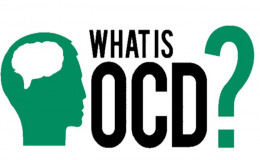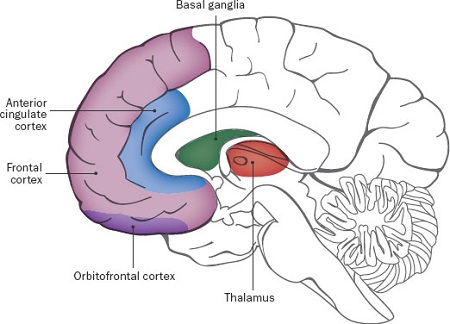"OCD is not a disease that bothers; it is a disease that tortures", here are seven signs that you may have OCD-know its Signs, Symptoms, and Treatment

It's totally normal to go back and check whether the iron you just used is unplugged the second time or of your car is locked. But if a person is suffering from obsessive-compulsive disorder (OCD), obsessive and compulsive thoughts becomes so intense that it seriously affects your daily life.
It's totally normal to go back and check whether the iron you just used is unplugged the second time or your car is locked or not. But if a person is suffering from obsessive-compulsive disorder (OCD), obsessive and compulsive thoughts becomes so intense that it starts affecting your daily life.
OCD involves some unwanted thoughts, images, or urges or simply obsessions that obstruct into a child/teen's mind and causing serious anxiety or discomfort. With an intention to reduce the discomfort, the person gets engaged in repetitive behaviors or mental acts (compulsions).
So, how can you tell you have OCD tendencies? There is no easy way to find out it usually needs an expert's help, but there are certain signs and patterns that say you may be suffering from OCD.
What Is Obsessive Compulsive Disorder?
Obsessive Compulsive Disorder (OCD) involves some unwanted and disturbing thoughts or urges (obsessions) that make people feel the need to check things repeatedly, perform some rituals or have some repeated thoughts.

These obsessions and compulsions interfere one's daily activities and cause significant distress. For example, you may fear that everything you thought in the surrounding has germs on it. So you tend to wash your hand, again and again, to get rid of germs.
What Causes OCD?
Experts and researchers are still trying their best to know the exact cause of obsessive-compulsive disorder. They suggest that there may be issues in the pattern the brain sends information to other parts.

An insufficiency chemical known as serotonin may be the reason behind the cause. Some experts believe that a problem related to streptococcal infections like strep throat and scarlet fever can cause the disorder or make the condition even severe.
Some Signs You May Have OCD
Certain patterns may indicate you might be the one suffering from OCD. Here are seven most common signs:
1. Hand Washing
Hand washing or use of hand sanitizer is most frequent in people suffering from OCD. Need to wash hands more frequently just to feel safe and clean is a classic warning sign.
It can also be rooted in fears of making others sick or being impure or immoral.
2. Excessive Cleaning
If you tend to compulsively clean, you might fall into the 'washers' category. Many people suffering from OCD can feel a sense of relief by cleaning the house and surrounded areas.

Source: Mr. Muscle
In addition to from hand washing, housecleaning is also a way of easing germaphobia. Although an individual gets instant relief, the feeling won't last long.
3. Checking Behavior
It's usually normal to check if all the electronic gadgets are properly unplugged the second time but if the so-called checking behaviors are returning three, four, or even 20 times you may be the one suffering the disorder.

Source: Daily Mail
Like other compulsive behaviors, checking can be driven by a variety of obsessions from a feeling of fear to the feeling of irresponsibility.
4. Counting
Some people have a habit of performing their daily task as per some numeric pattern. Superstitions may drive such behaviors.
For example, if someone thinks seven is a lucky number, the thought may lead to feel that they'll hurt themselves or someone if they don't follow the pattern of seven.
5. Fear Of Violence
Everybody has some fleeting thoughts about the possibility of violence or other misfortunes that may occur in future. The more we try to avoid thoughts the more such ideas pop into our heads.

Source: Worry Wise Kids
Experts say, they "could be trying harder to suppress these thoughts" or "or they may react more intensely to them because they deem them as unacceptable."
If a person has dark thoughts most often, it could be a sign of OCD.
6. Unwanted Sexual Thoughts
Just like other violent thoughts, people may have thoughts about inappropriate or taboo sexual behavior.
Patient suffering from OCD starts assuming that they are going to harass their coworker or molest a child. Some even think themselves as a gay instead of being straight.
7. Hating Your Looks
Body dysmorphic disorder (BDD) is a condition closely related to OCD. People try to fix the body parts they consider abnormal or unattractive.
Unlike eating disorders, BDD is more prevalent in people with OCD. In addition to their looks, they also worry about the cleanliness of their body.
Symptoms of OCD
Just because you have obsessive thoughts or perform compulsive behaviors doesn't mean that you have OCD. With OCD, these thoughts, and behaviors interfere your daily life and relationships.
Some common obsessive thoughts in OCD
- Fear of being contaminated by germs or dirt or fear of contaminating others
- Excessive focus on religious or moral thoughts
- Unwanted sexual or violent thoughts and images
- Fear of losing or not having things you need
- Fear of being responsible for something terrible happening, fear of harming others
- Concerned about evenness or exactness and concerned with a need to know or remember everything
- Fear of harming oneself or fear of violent or horrific images in one's mind
Common Compulsive behaviors in OCD
- Washing hands, showering, bathing, tooth-brushing and grooming time and again. Cleaning households in other to prevent or remove contact with contaminants is also spotted in most people.
- Mental review of an event to prevent harm; excessive praying, counting while performing a specific task to end with a good number and canceling or undoing some important tasks all of a sudden.
- Repeatedly checking whether you harm yourself or others; monitoring if something terrible has happened, checking a mistake in tasks and checking the physical condition or some parts of your body.
- Some other compulsions include putting things in order or arranging thing until it 'feels right', telling asking or confessing to get reassurance or avoiding situations that obsess you.
Some Facts about OCD
1. OCD may begin in an individual between ages 7 and 12.
2. It is more common in boys than girls in childhood, but in adult, women are more affected than men.
3. OCD symptoms can change over time. For example, if a child has a compulsive behavior of washing hands repeatedly, that may shift to other forms of compulsions.
4. The condition may affect 2-3% of children and adults during their lifetime
Common Situations or Affected Areas
As stated previously, the Obsessive-compulsive disorder can seriously affect your daily life and habits.
Some of the most affected areas are:
- Punctuality
- Grades
- School or Athletic performance
- Friendships
- Organization and working pattern
- Personal Hygiene
- Meal Times
- Recreational Activities and Participation
Tips For Getting Rid Of OCD
Living a healthy, balanced lifestyle plays a big role in keeping OCD compulsions, fears and worry at bay.
1. Practice Relaxation Techniques
Stress doesn't necessarily cause OCD, but it can trigger the symptom and makes the condition even worse.

Meditation, yoga and some other relaxation techniques can help an individual lower stress and tension levels and help manage your urges.
2. Avoid Alcohol And Nicotine
Though alcohol gives you temporary relief from anxiety, it actually causes anxiety symptoms as it wears off. Similarly, nicotine is actually a powerful stimulant increasing the levels of anxiety and OCD symptoms.

Hence, it's best to avoid drinking and smoking habits.
3. Get Enough Sleep
Not only can anxiety and worry cause insomnia, but lack of enough sleep can accelerate anxious thoughts and feelings.

Hence, getting enough sleep at the right time can help you avoid OCD to a great extent.
4. Regular Exercises
Exercise is a natural and one of the most effective methods to control OCD symptoms. For an effective result perform a regular exercise for 30 minutes or more.

Ten minutes of workout several times a day can also be effective.
Treatment And Prevention
There's no sure way to prevent obsessive-compulsive disorder. If you observe such behaviors in yourself some others around you, it's better to consult the physician and get effective treatment methods.

Proper counseling and cognitive-behavioral therapy can be effective to refrain the compulsive behaviors and reduce anxiety.
For more information and medications it's best to consult a physician and get proper treatment methods.
